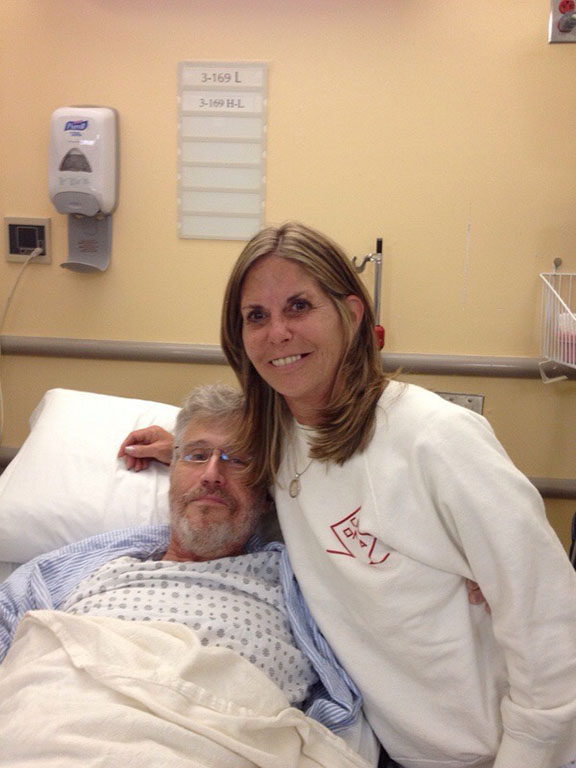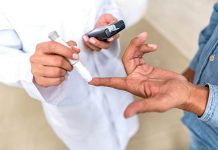By Jenna O’Donnell
Art Steinmen needed a miracle.
After dealing with chronic kidney disease since childhood, Steinman’s kidneys were failing by his 63rd birthday. In 2011, his condition had deteriorated to the point that he was a candidate for a kidney transplant.
Facing dialysis – due to additional complications with his kidneys – and a possible years-long wait to join the United Network for Organ Sharing, the Fair Haven resident started to look for a donor. On a Facebook group for a camp his parents had opened in the 1960s, Steinman put up a post, “Calling All Campers With Kidneys.”
He figured it was worth a shot, but didn’t expect what came next.
A former camper named Laurie Braverman read his post. Braverman, who lived in New York, had known and loved Steinman’s parents and their summer camp. After seeking out possible kidney donors, Braverman finally messaged Steinman to find out how she could go about becoming a donor.
Months later, Steinman had a new kidney – and a new sister in Laurie, with whom he had bonded in the lead-up to the surgery. “I still can’t believe it,” he said. “It changed my outlook and it’s allowed me to live a longer healthier life.”
Since his surgery in 2013, Steinman has advocated for organ donation, emphasizing the need for living kidney donors. By sharing his story with others, which he did recently at Congregation B’nai Israel in Rumson, he hopes that it might inspire people to do something miraculous and scary for a friend or a stranger.
“It really changed my life,” Steinman said. “I have a kidney that someone selflessly gave to me and I have to make sure I take care of it.”
The kidney transplant Tom Nardini received 12 years ago was not only life-saving and life-changing, it made him an organ donation advocate as well.
“That’s my definition of a hero,”said Nardini about his donor. “A person who puts their life on the line to save someone’s life.”

Courtesy Art Steinman
Although an article written about Nardini, of Monroe and formerly Colts Neck, and his plight resulted in a handful of prospective donors, his donor was an acquaintance who was moved by his story. That donor is 85 years old now, doing well and wants to remain anonymous. “He put his life on the line for me, and I’m grateful.”
He told Nardini afterward it was an incredible experience. “Altruism is a powerful thing,” said Nardini, who unfortunately needs another kidney transplant. “If more people knew about how easy it is and how rewarding it is,” he said, “they would be lining up to donate.”
Currently, about 115,000 people in the United States are awaiting a lifesaving organ transplant and 4,000 of them live in New Jersey. In 2018, 1,000 New Jersey residents were added to that list. Nationally, 20 people die every day while waiting for an organ transplant. In contrast, only about 1 percent of people are viable donors.
This disparity, along with the sensitivity of the subject, is why health care professionals are eager to spread the message of how important it is to register as an organ donor.
While some organs, such as kidneys, can be donated while the donor is alive, most organ and tissue donations occur after the donor has died.
Hackensack Meridian Riverview Medical Center and Bayshore Medical Center will have a flag-raising, and representatives of NJ Sharing Network will be on hand to answer questions and commemorate Blue and Green Day April 12. That’s the day the public is encouraged to wear blue and green, hold events and to help promote the success of organ, eye and tissue transplantation and the extreme need for registered donors.
Throughout the month of April, National Donate Life Month, a collaboration between Monmouth Medical Center and NJ Sharing Network has strived to get the word out, through educational programs, community outreach, and the green lights that illuminate the hospital’s exterior all month long.
“We want to make this is a standard topic of conversation,” said Maureen Bowe, MSN, RN, administrative director of Critical Care and Nursing Resources at Monmouth Medical Center. “We want to normalize the conversation about organ donation and encourage people, once they sign up, to share it with their loved ones.”
Tina Bezerra, NJ Sharing Network Hospital Services manager, said there are three ways to register as an organ and tissue donor: by logging into the Health App and joining the Donate Life registry, by visiting the Department of Motor Vehicles, or by going online at njsharingnetwork.org.
Bowe notes that all those who register as organ donors should discuss their decision with their loved ones. “That’s one of our key points,” said Bowe. “Let your family members know so that your decision is not a surprise.”
For the last two years, the hospital’s efforts have earned the highest level of recognition from HRSA, an agency of the Department of Health and Human Services. Eric Carney, chief executive officer at Monmouth Medical Center, expressed pride in that achievement.
“We remain dedicated to working collaboratively with the New Jersey Sharing Network so that no potential donor is overlooked and we will remain steadfast in our efforts to support organ and tissue donation,” Carney said.
In addition to advocacy, the partnership between hospitals and NJ Sharing Network supports and prepares families as they make crucial decisions and empowers them to give life.
“It is the most altruistic gift,” Bowe said. “It’s the one positive aspect that has come out of a tragedy.
That’s what we hear over and over again from families. It’s quite remarkable that at the worst moment of someone’s life they give the ultimate gift to someone else.”














